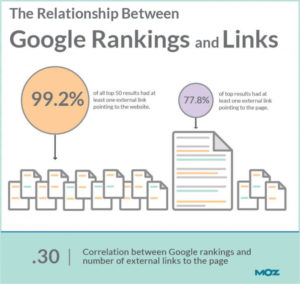Are Backlinks Still Important to Achieve High Rankings in Google?
Why Backlinks Matter For SEO
There are billions of pages on the web and that number continues to grow each day.
Google’s mission is to organise that data so it can be easily accessible with a search. Whether you are searching for product reviews of the newest gadget or the latest news in your industry, you can find exactly what you are looking for with a query. And all in an instant with practically no effort on your end.
It’s a monumental task that has taken years of development and billions of dollars.
So how do search engines determine rankings for each query?
Backlinks.
The more links a page has, the better chances it has of ranking in the search results. Other sites linking to your own is a good indication of its popularity. This is why attracting backlinks has been a core strategy for marketers.
It used to be that improving rankings simply involved building as many links as possible and it actually worked for awhile. But widespread link spamming has led to massive changes in the algorithm update including cracking down on those sites engaged in manipulative link building practices.
Do these changes mean that backlinks are no longer effective?
Not at all.
Here we provide more information about backlinks and why they still matter.
Moz Backlink Study

Moz conducted an extensive study on backlinks. The purpose was to examine the relationship between links and rankings, and assess how much of an impact they really have in terms of SEO. The study examined links to the top 50 results for approximately 15,000 competitive keywords.
Moz found that 99.2% of sites had at least one external link while 77.8% of individual pages had at least one link. In fact, you would be hard pressed to find a site ranking in the top positions for a competitive keyword without a link.
The correlation between rankings and the number of links is at .30. At first glance this number may seem small but backlinks actually had one of the highest correlations in the study. This is likely due to the fact that there are hundreds of ranking signals so one factor alone does not carry more weight than the others.
So what can we conclude from the study?
1. External Links Still Matter
Links don’t carry as much weight now as they did before.
But the results from the study make it clear that nearly every single site in the top results for competitive terms have at least one external link. Links are not solely responsible for these rankings as other factors are at play. Google evaluates hundreds of different factors to determine rankings.
These include:
- Domain authority
- Content relevance
- On-page optimisation
- Engagement data
- Social metrics
Links are still important from an SEO perspective especially from relevant sources. If you want you to rank for competitive terms in your industry, implementing a link building strategy is a must. In fact, you would find it practically impossible to find a site that ranks well without external links.
2. It’s Possible to Rank Without Links
We know that links are a crucial ranking signal. And we also know that a majority of sites ranking for competitive terms have links from at least one external site. What about ranking without any backlinks at all? Is it possible?
Yes, but it’s incredibly difficult.
However, there are two scenarios where it is entirely possible to rank without links:
- Long tail keywords: Unique keywords have little competition so they are generally easier to rank for. To rank on the first page you could target more obscure phrases. But keep in mind that such phrases often have little traffic so it may be better to focus your efforts on more competitive terms that actually generate traffic.
- Domain authority: Established sites such as well-known media publications have already built authority with Google. New content quickly gets crawled and indexed which can show up in the search results in a short amount of time. But your site may not have this advantage especially if it is still new.
Google sees quality links as a sign of authority. Implementing a link building strategy needs to be a priority to have any chance of ranking for your keywords. Otherwise your SEO campaign would be at a significant disadvantage, even before you start. This is often the reason why some companies struggle to rank because they neglect the importance of quality backlinks.
3. More Links is Correlated With Higher Rankings
It seems obvious but the study confirmed a strong correlation between external links and rankings. All other factors beings equal, a page with more links would outrank another page with fewer links.
So does this mean you should build as many links as possible to your pages?
Not necessarily.
In fact, doing so could have the opposite effect and actually cause rankings to tank. The Penguin update that Google released targeted sites engaged in questionable link building practices. Many sites that were once ranking were suddenly nowhere to be found in the search results.
Quality and relevance are two of the most important factors for links.
A link from a relevant source that is recognised as an industry leader (such as a news media outlet) will carry far more weight than links from spammy sources. Another factor that influences rankings is the competition. If the keywords you are targeting are extremely competitive then you would need more links to push your rankings up. But if the keywords are not very competitive or you compete in an obscure niche, you may only need a few links to start ranking.
As Google continues to update its ranking algorithm, quality will increasingly matter. Building spammy links or engaging in questionable practices can be more harmful than beneficial. And Google will not hesitate to penalise such sites with lower rankings.
So are backlinks needed to achieve top rankings?
Absolutely.
The more quality links you build to your pages, the better you rank for your target keywords.
